Books by Eric Morier-Genoud
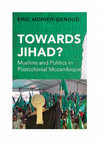
Hurst / Oxford University Press, 2023
The important full history of Islamic politics in Mozambique, from independence to the current in... more The important full history of Islamic politics in Mozambique, from independence to the current insurgency, looking beyond the lens of ‘jihadism’.
Since 2017, Mozambique has been confronted with a jihadi insurgency. This book looks at the origins of that insurgency, and the broader and longer history of the relationship between Islam and politics in the country. Did Mozambique’s Muslim politics always point towards jihad?
Eric Morier-Genoud examines the period immediately after independence, when the state engaged in anticlericalism; he then moves across the decades to the 2000s, when the ruling party and the opposition alike courted Muslims for electoral purposes, before reaching the 2010s, when tensions between ‘mosque and state’ returned. Along the way, he explores a wide variety of phenomena, including the rise of Wahhabism, religious competition, state mediation, secularism, the alleged growth and radicalisation of Islam, and the origins of the ongoing insurgency. What emerges is a rich history, attentive to different branches and elements of the Muslim community, looking far beyond the narrow perspective of jihad.
Taking a socio-historical perspective, Towards Jihad? unpacks a complex dynamic, which the jihadi insurgency is in fact now disrupting. Understanding the long history of Muslims’ engagement with politics in Mozambique sheds light on where the country has come from, where it stands now amidst violent unrest, and where it might go next.
Antipodes, 2020
Georges-Louis Liengme, médecin-missionnaire de la Mission Romande, passa trois ans à la cour de l... more Georges-Louis Liengme, médecin-missionnaire de la Mission Romande, passa trois ans à la cour de l’empereur Goungounyane, entre 1892 et 1895, dans le sud-est de l’Afrique. Il y évangélisa, opéra et vécut ainsi les dernières années et les dernières heures de l’empire de Gaza. Ce livre reproduit des extraits de son journal de bord et des photos de son séjour dans ce qui deviendra le sud-Mozambique. Il décrit la Cour, ses personnages, son quotidien, sa pratique de la médecine, la chute de l’empire de Gaza et les débuts de la Mission Romande en Afrique.

Rochester University Press, 2019
This book is concerned with the internal diversity and complexity of the Roman Catholic Church. I... more This book is concerned with the internal diversity and complexity of the Roman Catholic Church. It aims at exploring, unpacking, and explaining how the Roman Catholic institution works, how its politics are made, and how the latter impact its environment. Using the diocese of Beira in central Mozambique as a case study, and following insights by Max Weber, author Eric Morier-Genoud takes the novel "horizontal" approach of looking at congregations within the Church as a series of autonomous entities, rather than focusing on the hierarchical structure of the institution.
Between 1940 and 1980, the diocese of Beira was home to some fifteen different congregations ranging from Jesuits to Franciscans, from Burgos to Picpus fathers. As in many areas of the world, the 1960s brought conflict to Catholic congregations in central Mozambique, with African nationalism and the reforms of Vatican II playing a part. The conflict manifested in many ways: a bishop's flight from his diocese, a congregation abandoning the territory in protest against the collusion between church and state, and a declaration of class struggle in the church. All of these events, occurring against the backdrop of the war for Mozambican independence, make the region an especially fruitful location for the pioneering analysis proffered in this important study.
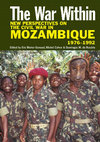
James Currey, 2018
A fresh analysis of the post-colonial war in Mozambique that contributes to debates about conflic... more A fresh analysis of the post-colonial war in Mozambique that contributes to debates about conflict, peacebuilding, development and nationalism and offers insights into the nature of contemporary politics and the current conflict.
The 1976-1992 civil war which opposed the Government of Frelimo and the Renamo guerrillas (among other actors) is a central event in the history of Mozambique. Aiming to open up a new era of studies of the war, this book re-evaluates this period from a number of different local perspectives in an attempt to better understand the history, complexity and multiple dynamics of the armed conflict. Focusing at local level on either a province or a single village, the authors analyse the conflict as a "total social phenomena" involving all elements of society and impacting on every aspect of life across the country. The chapters examine Frelimo and Renamo as well as private, popular and state militias, the Catholic Church, NGOs and traders. Drawing on previously unexamined sources such as local and provincial state archives, religious archives, the guerrilla's own documentation and interviews, the authors uncover alternative dimensions of the civil war. The book thus enables a deeper understanding of the conflict and its actors as well as offering an explanatory framework for understanding peacemaking, the nature of contemporary politics, and the current conflict in the country.
Palgrave
This volume explores the role and history of migration and diaspora within the Portuguese empire,... more This volume explores the role and history of migration and diaspora within the Portuguese empire, investigating what role colonial communities and diaspora have had in shaping the Portuguese empire and its heritage. The book consists of twelve case studies which look at topics such as Portuguese migration to Africa, the Ismaili and the Swiss presence in Mozambique, the Goanese in East Africa, the Chinese in Brazil, and the history of the African presence in Portugal.
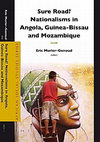
Brill
This book brings together new research on the subject of nations and nationalisms in Angola, Guin... more This book brings together new research on the subject of nations and nationalisms in Angola, Guinea-Bissau and Mozambique. It explores the history and politics of diverse nationalist discourses and ideologies, and it revisits the formation and contemporary developments of national imagined communities in Portuguese-speaking Africa. It does so by drawing on several disciplines and by exploring themes as diverse as Frelimo’s liberation literature, UNITA’s moral economy and the disaggregation of Guinea-Bissau. The authors provide novel insights in the hope of contributing to the academic and public debate on the subject, not least in those countries where, in the face of liberalisation, ruling parties and their opponents have been arguing intensively over, and have sometime struggled to re-invent, a sense of national community. Through their engagement with the subject, authors also make a contribution to the general discussion of the concepts of nations and nationalism
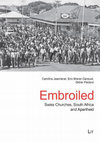
Apartheid posed profound challenges to the conceptions of humanity and development that dominated... more Apartheid posed profound challenges to the conceptions of humanity and development that dominated the world stage after World War II. Embroiled analyses the manner in which international religious organisations dealt with the formulation and implementation of apartheid. It studies this question through an examination of the Swiss Mission in South Africa (SMSA), an institution that acted in South Africa, Switzerland and the international ecumenical community. As socially embedded institution, the SMSA mirrored divisions present within Swiss and South African societies on the issue of apartheid.
"Embroiled brings out the complex, even turbulent, nature of a missionary society: at once political intermediary, spiritual guide and non-government organisation. Caught between different communities and discrete continents, missionaries discussed and debated their role in South Africa and attempted, however fitfully, to respond to the changes that swept through the country, particularly as opposing nationalisms fought to seize hold of it." From the preface by Patrick Harries, University of Basle
Articles & chapters by Eric Morier-Genoud
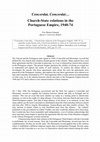
in Jairzinho Lopes Pereira (ed.), Church-State Relations in Africa in the Nineteenth and Twentieth Centuries. Mission, Empire, and the Holy See, London: Palgrave Macmillan (coll. Cambridge Imperial and Post-Colonial Studies), 2022, pp.111-134, 2022
The Vatican and the Portuguese state signed in 1940 a Concordat and Missionary Accord that define... more The Vatican and the Portuguese state signed in 1940 a Concordat and Missionary Accord that defined the way church-state relations should operate in the colonies. Many analysts have used these agreements and the Concordat in particular, as a way to characterise church-state relation in the Portuguese empire. The present chapter questions the validity of relying on a legal text to understand and capture the reality of such relations. To analyse the subject afresh, it investigates the reasons why these agreements came about, the ways the agreements were practiced in the Portuguese colonies, and explores the way these agreements were altered over time and eventually terminated in 1975. Such approach offers a richer and novel understanding of what went on in the relation between church and state in the Portuguese Empire between 1940 and 1975 and it allows a new characterisation of these relations.
"The jihadi insurgency in Mozambique: origins, nature and beginning"
Journal of Eastern African Studies, 2020
For the last three years, Mozambique has been facing an insurgency in its northern province of Ca... more For the last three years, Mozambique has been facing an insurgency in its northern province of Cabo Delgado. There is much confusion and debate as to what is going on. Who are the insurgents, what do they want, and where do they come from? Debates have focused particularly on the role of religion and the external dimension of the insurgency. Drawing on fieldwork from 2018 and 2019, this paper focuses on the first attack of the insurgents in October 2017 and uses this to explore the origin, nature and early history of the contemporary armed violence. It uncovers that the insurgents belong to an Islamist sect which began a decade earlier and shifted to armed jihadism in the mid-2010s.

"Antropólogos, missionários e imagens do continente africano - entrevista com Eric Morier-Genoud" (link to Open access)
Campos. Revista de Antropologia, 2020
Eric Morier-Genoud é Senior Lecturer na Queen’s Belfast University, Reino Unido. Fundador e ex-e... more Eric Morier-Genoud é Senior Lecturer na Queen’s Belfast University, Reino Unido. Fundador e ex-editor-chefe da revista Social Sciences & Missions ele publicou no ano passado a monografia Catholicism and the Making of Politics in Central Mozambique, 1940-1986 . Nesta entrevista, o professor Morier-Genoud, nos conta a respeito da sua trajetória acadêmica e dos itinerários que o levaram a se interessar por atividades missionárias no continente africano. Os objetos e contatos de pesquisa, permitiram a ele transitar entre a História e as Ciências Sociais ao longo de sua carreira. Suas indagações inovadoras oferecem pontos instigantes a respeito das relações entre colonialismo, ciência e religião. Assim, convidamos as leitoras e leitores a seguir as histórias de imagens de missionários africanos ou os dilemas deixados pela guerra civil em Moçambique, como modos de pensar histórias da antropologia.
Palavras-chave: Antropologia da África; Antropologia das Missões; História da Antropologia; Moçambique.
Eric Morier-Genoud is Senior Lecturer on Queen’s Belfast University, United Kingdom. Founder and former Editor-in-Chief of the Social Sciences & Missions Journal, he published last year the monograph Catholicism and the Making of Politics in Central Mozambique, 1940-1986. On this interview, professor Morier-Genoud, tells about his academic trajectory and the itineraries that led his interests for missionary activities on the African continent. The research objects and contacts allowed him to transit between History and Social Sciences throughout his career. His innovating questions offer instigating points concerning the relations amongst colonialism, science and religion. Thus we invite the readers to follow the stories of African missionary images or the dilemmas left by the civil war in Mozambique, as ways of thinking about the histories of anthropology.

Politique Africaine (Paris: Karthala), 2017
[English below]
Le Mozambique traverse une profonde crise depuis avril 2013 ayant donné lieu à ... more [English below]
Le Mozambique traverse une profonde crise depuis avril 2013 ayant donné lieu à des confrontations armées dans le centre du pays entre les forces armées du gouvernement et la Renamo. Le pays est-il en guerre ? Le sujet fait débat dans le pays. Des négociations ont été ouvertes mais traînent depuis trois ans et l’absence de résolution des tensions à l’origine des violences non seulement prolonge la crise, mais nourrit aussi l’idée que le pays se dirige vers une guerre pleine. Guerre et paix, négociations et conflit armé : que se passe-t-il donc au Mozambique ? L’article vise à identifier les origines et la nature du conflit depuis 2013 et à cerner les dynamiques fondamentales de la crise actuelle afin d’ébaucher des scenarii pour l’avenir. Il développe l’idée que le conflit est une « proto-guerre », limitée géographiquement et militairement. Celle-ci oppose le Frelimo et la Renamo dans une « négociation armée », entre eux mais aussi ensemble contre d’autres acteurs. En effet, tels des « ennemis complémentaires », les deux protagonistes luttent aussi pour conserver leur domination conjointe, contrôler en leur sein l’émergence de nouvelles générations de politiciens et restreindre la croissance rapide d’un nouveau parti d’opposition sur la scène politique nationale.
ABSTRACT
Proto-War and Negotiations: Mozambique in Crisis (2013-2016)Mozambique has been experiencing a profound political crisis since April 2013, with armed confrontations between the government armed forces and Renamo in the central part of the country. Is the country at war ? The subject is hotly debated in the country. Negotiations have been taking place for three years, but have dragged on. The lack of resolution of the tensions at the origin of the violence has not only prolonged the crisis, but also fed the idea that the country is heading towards a full war. War and peace, negotiations and armed conflict : what is happening in Mozambique ? The article aims to identify the origins and nature of the conflict and to decipher the fundamental dynamics of the current crisis in order to outline scenarios for the future. The text argues that the conflict is a “proto-war”, geographically and militarily limited, which opposes Frelimo and Renamo in an “armed negotiation” between themselves as well as together against other actors. Indeed just like “complementary enemies”, the two protagonists also fight together to retain their dominance, keep control over the emergence of new generations of politicians within their respective parties, and limit the rapid growth of a new party of opposition on the national political scene.
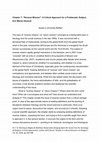
The topic of "reverse mission" (or "return mission") emerged as a fashionable topic in theology a... more The topic of "reverse mission" (or "return mission") emerged as a fashionable topic in theology and the social sciences in the late 1990s. It was concerned with a perceived flow of missionaries coming to the global North from the global South when in the past, missionaries left Europe and the Americas to evangelize the South (known successively as the colonial world and the Third World). The subject of reverse mission rapidly gained momentum in the literature, and in 2007 it was "crowned" with an entry in Jonathan Bonk's Encyclopedia of Mission and Missionaries (Ojo, 2007). Academics and church people alike debate what reverse mission is, what it should be, whether it is succeeding, and whether it is a key element of the future of Christianity, especially given the contemporary secularisation of the global North. Existing definitions of "reverse" and "return mission" are contradictory and approximate, and debates often conflate social science with theology and normative elements. While this has helped widen the discussion (into issues of migration, the trans-nationalisation of faith, and the globalisation of churches), it has blurred academic borders and weakened the scientific understanding of the issue.
AFRICANA STUDIA (Porto, Portugal), 2016
José Capela (pseudónimo de José Soares Martins) é muito conhecido como historiador da
escravatura... more José Capela (pseudónimo de José Soares Martins) é muito conhecido como historiador da
escravatura, das sociedades pré-coloniais e do movimento operário em Moçambique e em
Portugal. Menos conhecido é o seu percurso religioso e sua pesquisa sobre a Igreja Católica
em Moçambique. No entanto, estas duas facetas são tão importantes e interessantes como
os seus estudos históricos mais conhecidos. Um olhar sobre o percurso religioso de José
Capela e sua pesquisa sobre a igreja Católica deverá ajudar-nos a entender a sua personalidade e sua perspetiva socio-histórica. Nesta ordem de ideias, apresentarei dois elementos
no presente artigo, Capela, o padre e Capela e a história da Igreja Católica, em duas secções
sucessivas, antes duma conclusão onde tentarei sublinhar alguns traços da personalidade e
da visão de “Zé Capela”.
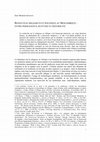
Politique Africaine, Jun 1, 2014
Religious Revival in Mozambique: between Continuity, Rupture and Historicity Research on religio... more Religious Revival in Mozambique: between Continuity, Rupture and Historicity Research on religion in Africa has focused ever more in the last twenty years on the question of the “religious revival”, and it has usually focused on the question of the ruptures and innovations that resulted from it. This article questions the reality of the “religious revival” in Africa and explores, on the basis of a case study, the issue of change and continuity in religious change. In a first section, the text looks at the nature of the religious revival in Mozambique; it then examines the historical and denominational continuities which exist in the revival; a last section investigates the impact religious transformations have had on the political realm. The conclusion tries to unpack the question of ruptures and continuities and to think the question of a religious revival beyond this dichotomy.
This chapter examines the Roman Catholic Church in Mozambique during the periods of revolution, w... more This chapter examines the Roman Catholic Church in Mozambique during the periods of revolution, war, and democracy, from 1975 to 2000. It proceeds
in three steps. First, it presents the historical formation of the Catholic Church in Mozambique; second, it looks at the Church’s reorganization and action after independence under Socialism and conditions of war; and finally it analyses how the Church became a mediator of peace and a midwife for democracy
in the country in the early 1990s.
Faisant appel à une approche culturelle, transnationale et généalogique, cet article étudie le tr... more Faisant appel à une approche culturelle, transnationale et généalogique, cet article étudie le travail d'un missionnaire suisse, Henri-Philippe Junod, entre l'Europe et l'Afrique. Il ne s'agit pas d'examiner ce qu'il a amené en Afrique, ou ramené d'Afrique, mais de voir comment ce mouvement de va-et-vient a contribué à la formation de nouvelles idées et institutions de manière globale. Cet article se penche sur la contribution de Junod dans trois domaines en particulier, à savoir l'anthropologie, les droits de l'homme dans le monde entier, et les études africaines en Suisse.
“Twenty Years after Of Revelation and Revolution: An Interview with Jean Comaroff”, Social Sciences and Missions (Leiden: Brill), vol.24(2-3), 2011, pp.148-170
Social Sciences and Missions (Leiden: Brill), 2011
Jean Comaroff and John Comaroff's acclaimed Of Revelation and Revolution (Vol. I) has reached its... more Jean Comaroff and John Comaroff's acclaimed Of Revelation and Revolution (Vol. I) has reached its 20th anniversary. SSM editor Eric Morier-Genoud takes this as an opportunity to conduct an interview with Jean Comaroff, in which they discuss Jean's intellectual trajectory and her views of the present. The interview elicits Jean Comaroff's reflections on the origins and heritage of Revelation and Revolution, and it discusses her and her husband's recent book about the privatisation of identities and religion.











Uploads
Books by Eric Morier-Genoud
Since 2017, Mozambique has been confronted with a jihadi insurgency. This book looks at the origins of that insurgency, and the broader and longer history of the relationship between Islam and politics in the country. Did Mozambique’s Muslim politics always point towards jihad?
Eric Morier-Genoud examines the period immediately after independence, when the state engaged in anticlericalism; he then moves across the decades to the 2000s, when the ruling party and the opposition alike courted Muslims for electoral purposes, before reaching the 2010s, when tensions between ‘mosque and state’ returned. Along the way, he explores a wide variety of phenomena, including the rise of Wahhabism, religious competition, state mediation, secularism, the alleged growth and radicalisation of Islam, and the origins of the ongoing insurgency. What emerges is a rich history, attentive to different branches and elements of the Muslim community, looking far beyond the narrow perspective of jihad.
Taking a socio-historical perspective, Towards Jihad? unpacks a complex dynamic, which the jihadi insurgency is in fact now disrupting. Understanding the long history of Muslims’ engagement with politics in Mozambique sheds light on where the country has come from, where it stands now amidst violent unrest, and where it might go next.
Between 1940 and 1980, the diocese of Beira was home to some fifteen different congregations ranging from Jesuits to Franciscans, from Burgos to Picpus fathers. As in many areas of the world, the 1960s brought conflict to Catholic congregations in central Mozambique, with African nationalism and the reforms of Vatican II playing a part. The conflict manifested in many ways: a bishop's flight from his diocese, a congregation abandoning the territory in protest against the collusion between church and state, and a declaration of class struggle in the church. All of these events, occurring against the backdrop of the war for Mozambican independence, make the region an especially fruitful location for the pioneering analysis proffered in this important study.
The 1976-1992 civil war which opposed the Government of Frelimo and the Renamo guerrillas (among other actors) is a central event in the history of Mozambique. Aiming to open up a new era of studies of the war, this book re-evaluates this period from a number of different local perspectives in an attempt to better understand the history, complexity and multiple dynamics of the armed conflict. Focusing at local level on either a province or a single village, the authors analyse the conflict as a "total social phenomena" involving all elements of society and impacting on every aspect of life across the country. The chapters examine Frelimo and Renamo as well as private, popular and state militias, the Catholic Church, NGOs and traders. Drawing on previously unexamined sources such as local and provincial state archives, religious archives, the guerrilla's own documentation and interviews, the authors uncover alternative dimensions of the civil war. The book thus enables a deeper understanding of the conflict and its actors as well as offering an explanatory framework for understanding peacemaking, the nature of contemporary politics, and the current conflict in the country.
"Embroiled brings out the complex, even turbulent, nature of a missionary society: at once political intermediary, spiritual guide and non-government organisation. Caught between different communities and discrete continents, missionaries discussed and debated their role in South Africa and attempted, however fitfully, to respond to the changes that swept through the country, particularly as opposing nationalisms fought to seize hold of it." From the preface by Patrick Harries, University of Basle
Articles & chapters by Eric Morier-Genoud
Palavras-chave: Antropologia da África; Antropologia das Missões; História da Antropologia; Moçambique.
Eric Morier-Genoud is Senior Lecturer on Queen’s Belfast University, United Kingdom. Founder and former Editor-in-Chief of the Social Sciences & Missions Journal, he published last year the monograph Catholicism and the Making of Politics in Central Mozambique, 1940-1986. On this interview, professor Morier-Genoud, tells about his academic trajectory and the itineraries that led his interests for missionary activities on the African continent. The research objects and contacts allowed him to transit between History and Social Sciences throughout his career. His innovating questions offer instigating points concerning the relations amongst colonialism, science and religion. Thus we invite the readers to follow the stories of African missionary images or the dilemmas left by the civil war in Mozambique, as ways of thinking about the histories of anthropology.
Le Mozambique traverse une profonde crise depuis avril 2013 ayant donné lieu à des confrontations armées dans le centre du pays entre les forces armées du gouvernement et la Renamo. Le pays est-il en guerre ? Le sujet fait débat dans le pays. Des négociations ont été ouvertes mais traînent depuis trois ans et l’absence de résolution des tensions à l’origine des violences non seulement prolonge la crise, mais nourrit aussi l’idée que le pays se dirige vers une guerre pleine. Guerre et paix, négociations et conflit armé : que se passe-t-il donc au Mozambique ? L’article vise à identifier les origines et la nature du conflit depuis 2013 et à cerner les dynamiques fondamentales de la crise actuelle afin d’ébaucher des scenarii pour l’avenir. Il développe l’idée que le conflit est une « proto-guerre », limitée géographiquement et militairement. Celle-ci oppose le Frelimo et la Renamo dans une « négociation armée », entre eux mais aussi ensemble contre d’autres acteurs. En effet, tels des « ennemis complémentaires », les deux protagonistes luttent aussi pour conserver leur domination conjointe, contrôler en leur sein l’émergence de nouvelles générations de politiciens et restreindre la croissance rapide d’un nouveau parti d’opposition sur la scène politique nationale.
ABSTRACT
Proto-War and Negotiations: Mozambique in Crisis (2013-2016)Mozambique has been experiencing a profound political crisis since April 2013, with armed confrontations between the government armed forces and Renamo in the central part of the country. Is the country at war ? The subject is hotly debated in the country. Negotiations have been taking place for three years, but have dragged on. The lack of resolution of the tensions at the origin of the violence has not only prolonged the crisis, but also fed the idea that the country is heading towards a full war. War and peace, negotiations and armed conflict : what is happening in Mozambique ? The article aims to identify the origins and nature of the conflict and to decipher the fundamental dynamics of the current crisis in order to outline scenarios for the future. The text argues that the conflict is a “proto-war”, geographically and militarily limited, which opposes Frelimo and Renamo in an “armed negotiation” between themselves as well as together against other actors. Indeed just like “complementary enemies”, the two protagonists also fight together to retain their dominance, keep control over the emergence of new generations of politicians within their respective parties, and limit the rapid growth of a new party of opposition on the national political scene.
escravatura, das sociedades pré-coloniais e do movimento operário em Moçambique e em
Portugal. Menos conhecido é o seu percurso religioso e sua pesquisa sobre a Igreja Católica
em Moçambique. No entanto, estas duas facetas são tão importantes e interessantes como
os seus estudos históricos mais conhecidos. Um olhar sobre o percurso religioso de José
Capela e sua pesquisa sobre a igreja Católica deverá ajudar-nos a entender a sua personalidade e sua perspetiva socio-histórica. Nesta ordem de ideias, apresentarei dois elementos
no presente artigo, Capela, o padre e Capela e a história da Igreja Católica, em duas secções
sucessivas, antes duma conclusão onde tentarei sublinhar alguns traços da personalidade e
da visão de “Zé Capela”.
in three steps. First, it presents the historical formation of the Catholic Church in Mozambique; second, it looks at the Church’s reorganization and action after independence under Socialism and conditions of war; and finally it analyses how the Church became a mediator of peace and a midwife for democracy
in the country in the early 1990s.
Since 2017, Mozambique has been confronted with a jihadi insurgency. This book looks at the origins of that insurgency, and the broader and longer history of the relationship between Islam and politics in the country. Did Mozambique’s Muslim politics always point towards jihad?
Eric Morier-Genoud examines the period immediately after independence, when the state engaged in anticlericalism; he then moves across the decades to the 2000s, when the ruling party and the opposition alike courted Muslims for electoral purposes, before reaching the 2010s, when tensions between ‘mosque and state’ returned. Along the way, he explores a wide variety of phenomena, including the rise of Wahhabism, religious competition, state mediation, secularism, the alleged growth and radicalisation of Islam, and the origins of the ongoing insurgency. What emerges is a rich history, attentive to different branches and elements of the Muslim community, looking far beyond the narrow perspective of jihad.
Taking a socio-historical perspective, Towards Jihad? unpacks a complex dynamic, which the jihadi insurgency is in fact now disrupting. Understanding the long history of Muslims’ engagement with politics in Mozambique sheds light on where the country has come from, where it stands now amidst violent unrest, and where it might go next.
Between 1940 and 1980, the diocese of Beira was home to some fifteen different congregations ranging from Jesuits to Franciscans, from Burgos to Picpus fathers. As in many areas of the world, the 1960s brought conflict to Catholic congregations in central Mozambique, with African nationalism and the reforms of Vatican II playing a part. The conflict manifested in many ways: a bishop's flight from his diocese, a congregation abandoning the territory in protest against the collusion between church and state, and a declaration of class struggle in the church. All of these events, occurring against the backdrop of the war for Mozambican independence, make the region an especially fruitful location for the pioneering analysis proffered in this important study.
The 1976-1992 civil war which opposed the Government of Frelimo and the Renamo guerrillas (among other actors) is a central event in the history of Mozambique. Aiming to open up a new era of studies of the war, this book re-evaluates this period from a number of different local perspectives in an attempt to better understand the history, complexity and multiple dynamics of the armed conflict. Focusing at local level on either a province or a single village, the authors analyse the conflict as a "total social phenomena" involving all elements of society and impacting on every aspect of life across the country. The chapters examine Frelimo and Renamo as well as private, popular and state militias, the Catholic Church, NGOs and traders. Drawing on previously unexamined sources such as local and provincial state archives, religious archives, the guerrilla's own documentation and interviews, the authors uncover alternative dimensions of the civil war. The book thus enables a deeper understanding of the conflict and its actors as well as offering an explanatory framework for understanding peacemaking, the nature of contemporary politics, and the current conflict in the country.
"Embroiled brings out the complex, even turbulent, nature of a missionary society: at once political intermediary, spiritual guide and non-government organisation. Caught between different communities and discrete continents, missionaries discussed and debated their role in South Africa and attempted, however fitfully, to respond to the changes that swept through the country, particularly as opposing nationalisms fought to seize hold of it." From the preface by Patrick Harries, University of Basle
Palavras-chave: Antropologia da África; Antropologia das Missões; História da Antropologia; Moçambique.
Eric Morier-Genoud is Senior Lecturer on Queen’s Belfast University, United Kingdom. Founder and former Editor-in-Chief of the Social Sciences & Missions Journal, he published last year the monograph Catholicism and the Making of Politics in Central Mozambique, 1940-1986. On this interview, professor Morier-Genoud, tells about his academic trajectory and the itineraries that led his interests for missionary activities on the African continent. The research objects and contacts allowed him to transit between History and Social Sciences throughout his career. His innovating questions offer instigating points concerning the relations amongst colonialism, science and religion. Thus we invite the readers to follow the stories of African missionary images or the dilemmas left by the civil war in Mozambique, as ways of thinking about the histories of anthropology.
Le Mozambique traverse une profonde crise depuis avril 2013 ayant donné lieu à des confrontations armées dans le centre du pays entre les forces armées du gouvernement et la Renamo. Le pays est-il en guerre ? Le sujet fait débat dans le pays. Des négociations ont été ouvertes mais traînent depuis trois ans et l’absence de résolution des tensions à l’origine des violences non seulement prolonge la crise, mais nourrit aussi l’idée que le pays se dirige vers une guerre pleine. Guerre et paix, négociations et conflit armé : que se passe-t-il donc au Mozambique ? L’article vise à identifier les origines et la nature du conflit depuis 2013 et à cerner les dynamiques fondamentales de la crise actuelle afin d’ébaucher des scenarii pour l’avenir. Il développe l’idée que le conflit est une « proto-guerre », limitée géographiquement et militairement. Celle-ci oppose le Frelimo et la Renamo dans une « négociation armée », entre eux mais aussi ensemble contre d’autres acteurs. En effet, tels des « ennemis complémentaires », les deux protagonistes luttent aussi pour conserver leur domination conjointe, contrôler en leur sein l’émergence de nouvelles générations de politiciens et restreindre la croissance rapide d’un nouveau parti d’opposition sur la scène politique nationale.
ABSTRACT
Proto-War and Negotiations: Mozambique in Crisis (2013-2016)Mozambique has been experiencing a profound political crisis since April 2013, with armed confrontations between the government armed forces and Renamo in the central part of the country. Is the country at war ? The subject is hotly debated in the country. Negotiations have been taking place for three years, but have dragged on. The lack of resolution of the tensions at the origin of the violence has not only prolonged the crisis, but also fed the idea that the country is heading towards a full war. War and peace, negotiations and armed conflict : what is happening in Mozambique ? The article aims to identify the origins and nature of the conflict and to decipher the fundamental dynamics of the current crisis in order to outline scenarios for the future. The text argues that the conflict is a “proto-war”, geographically and militarily limited, which opposes Frelimo and Renamo in an “armed negotiation” between themselves as well as together against other actors. Indeed just like “complementary enemies”, the two protagonists also fight together to retain their dominance, keep control over the emergence of new generations of politicians within their respective parties, and limit the rapid growth of a new party of opposition on the national political scene.
escravatura, das sociedades pré-coloniais e do movimento operário em Moçambique e em
Portugal. Menos conhecido é o seu percurso religioso e sua pesquisa sobre a Igreja Católica
em Moçambique. No entanto, estas duas facetas são tão importantes e interessantes como
os seus estudos históricos mais conhecidos. Um olhar sobre o percurso religioso de José
Capela e sua pesquisa sobre a igreja Católica deverá ajudar-nos a entender a sua personalidade e sua perspetiva socio-histórica. Nesta ordem de ideias, apresentarei dois elementos
no presente artigo, Capela, o padre e Capela e a história da Igreja Católica, em duas secções
sucessivas, antes duma conclusão onde tentarei sublinhar alguns traços da personalidade e
da visão de “Zé Capela”.
in three steps. First, it presents the historical formation of the Catholic Church in Mozambique; second, it looks at the Church’s reorganization and action after independence under Socialism and conditions of war; and finally it analyses how the Church became a mediator of peace and a midwife for democracy
in the country in the early 1990s.
Yet, as useful as this type of explanation may be, it usually fails to address properly, if at all, two sets of important issues. It avoids, rst, the question of the rise of other religions and their contribution to tensions and con icts. Second, it reduces the role of the State to a reactive one. The State becomes an object of contest or conquest, or it is simply ignored.
Adopting a different approach, this article investigates a controversy that took place in
Mozambique in 1996 around the ‘of cialisation’ of two Islamic holidays. It looks at the role played by religious competition and state mediation. The article shows that the State’s abandonment of religious regulation – the establishment of a free ‘religious market’ – fostered religious competition that created tensions between faiths. It suggests that strife ensued because deregulation was almost absolute: the State did not take a clear stand in religious matters and faith organisations started to believe that the State was becoming, or could become, confessional. The conclusion discusses theoretical implications for the understanding of religious strife as well as Church and State relations. It also draws some implications for the case of Mozambique more speci cally, implications which should have
relevance for countries such as Malawi, Zambia and Zimbabwe where problems of a
similar nature have arisen.
ed. / Emmanuel K. Akyeampong; Henry Louis Gates Jr.
Oxford University Press, 2011.
Católica enfrenta um desafio: cresce, mas menos do que as igrejas
protestantes, de onde emergiu Venâncio Mondlane, o pastor
evangélico neopentecostal resoluto em pôr fim a meio século de
regime da Frelimo. O académico Eric Morier-Genoud, especialista
em História das Religiões, explica à Além-Mar porque se tornou
popular o «discurso profético» de uma nova «terra prometida».
Texto: Margarida Santos Lopes, jornalista moçambique © 123RF Em 1988, quando João Paulo II visitou Maputo, o país vivia em guerra civil. Mais de três décadas depois, e antes de cruciais eleições marcadas para Outubro, o Papa Francisco chega, em Setembro, para abençoar um acordo que reconcilia a Frelimo, no poder, e a Renamo, na oposição. Um novo ciclo de governação com as armas em silêncio «seria histórico», afirma Eric Morier-Genoud, autor de um livro extraordinário sobre a singular Diocese da Beira. 2019 Setembro | além-mar Em 1988, quando João Paulo II visitou Maputo, o país vivia em guerra civil. Mais de três décadas depois, e antes de cruciais eleições marcadas para Outubro, o Papa Francisco chega, em Setembro, para abençoar um acordo que reconcilia a Frelimo, no poder, e a Renamo, na oposição. Um novo ciclo de governação com as armas em silêncio «seria histórico», afirma Eric Morier-Genoud, autor de um livro extraordinário sobre a singular Diocese da Beira.
Palavras-chave: Antropologia da África; Antropologia das Missões; História da Antropologia; Moçambique.